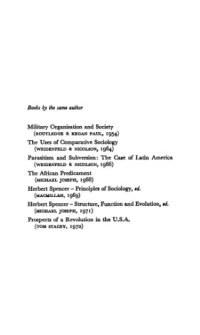
Ebook: Social Sciences as Sorcery
Author: Stanislav Andreski
- Year: 1972
- Publisher: Andre Deutsch Ltd
- City: London
- Language: English
- djvu
To judge by quantity, the social sciences are going through a
period of unprecedented progress: with congresses and
conferences mushrooming, printed matter piling up, and the
number of professionals increasing at such a rate that, unless
arrested, it would overtake the population of the globe within a
few hundred years. Most of the practitioners wax enthusiastic
about this proliferation, and add to the flood by writing
exultant surveys of their crafts 'to-day', readily affixing the label of
'revolution' to all kinds of most insignificant steps forward . . .
or even backwards; and sometimes even claiming to have
crossed the threshold separating their fields from the exact
sciences.
What is particularly dismaying is that not only does the flood
of publications reveal an abundance of pompous bluff and a
paucity of new ideas, but even the old and valuable insights
which we have inherited from our illustrious ancestors are
being drowned in a torrent of meaningless verbiage and useless
technicalities. Pretentious and nebulous verbosity,
interminable repetition of platitudes and disguised propaganda are
the order of the day, while at least 95% of research is indeed
re-search for things that have been found long ago and many
times since. In comparison with half a century ago, the average
quality of the publications (apart from those which deal with
techniques rather than the substance) has declined in a number
of fields.
Such a far-reaching verdict naturally calls for evidence, and
much of the present book is devoted to supplying it.
As the present book deals with the phenomena which must
be judged as undesirable from the standpoint of intellectual
progress, the references to the literature are as a rule derogatory.
This does not mean that I believe that nothing of value has
been produced; but one cannot write about everything at once,
and this is a tract rather than a treatise. Numerous positive
contributions to knowledge are cited in my previous
publications, and many more will be mentioned in other books which
are in preparation, particularly if I live long enough to write a
general treatise. I argue on the pages which follow that much
of what passes as scientific study of human behaviour boils
down to an equivalent of sorcery, but fortunately there are
other things as well.
period of unprecedented progress: with congresses and
conferences mushrooming, printed matter piling up, and the
number of professionals increasing at such a rate that, unless
arrested, it would overtake the population of the globe within a
few hundred years. Most of the practitioners wax enthusiastic
about this proliferation, and add to the flood by writing
exultant surveys of their crafts 'to-day', readily affixing the label of
'revolution' to all kinds of most insignificant steps forward . . .
or even backwards; and sometimes even claiming to have
crossed the threshold separating their fields from the exact
sciences.
What is particularly dismaying is that not only does the flood
of publications reveal an abundance of pompous bluff and a
paucity of new ideas, but even the old and valuable insights
which we have inherited from our illustrious ancestors are
being drowned in a torrent of meaningless verbiage and useless
technicalities. Pretentious and nebulous verbosity,
interminable repetition of platitudes and disguised propaganda are
the order of the day, while at least 95% of research is indeed
re-search for things that have been found long ago and many
times since. In comparison with half a century ago, the average
quality of the publications (apart from those which deal with
techniques rather than the substance) has declined in a number
of fields.
Such a far-reaching verdict naturally calls for evidence, and
much of the present book is devoted to supplying it.
As the present book deals with the phenomena which must
be judged as undesirable from the standpoint of intellectual
progress, the references to the literature are as a rule derogatory.
This does not mean that I believe that nothing of value has
been produced; but one cannot write about everything at once,
and this is a tract rather than a treatise. Numerous positive
contributions to knowledge are cited in my previous
publications, and many more will be mentioned in other books which
are in preparation, particularly if I live long enough to write a
general treatise. I argue on the pages which follow that much
of what passes as scientific study of human behaviour boils
down to an equivalent of sorcery, but fortunately there are
other things as well.
Download the book Social Sciences as Sorcery for free or read online
Continue reading on any device:

Last viewed books
Related books
{related-news}
Comments (0)